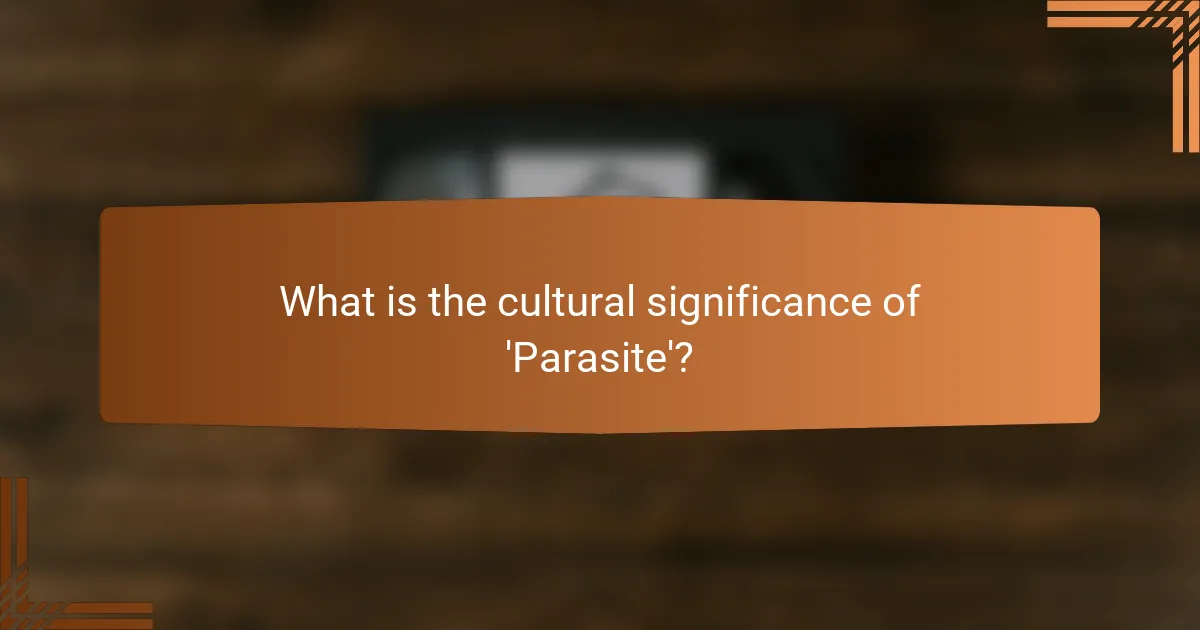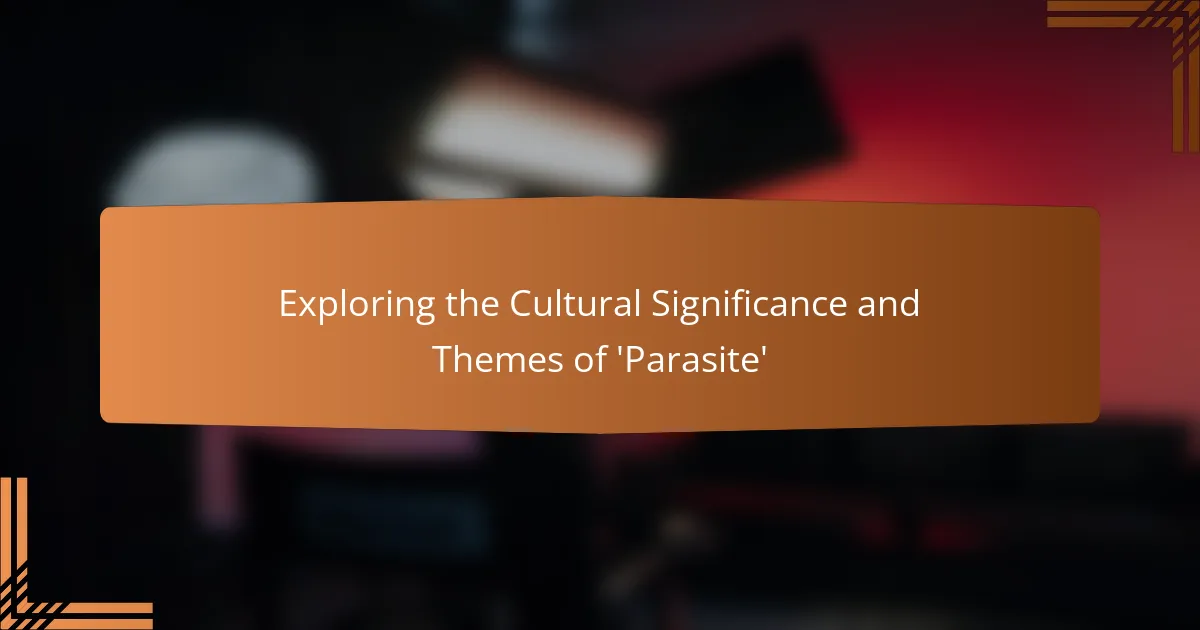‘Parasite’ is a critically acclaimed South Korean film that addresses significant cultural themes such as class disparity and social inequality. It portrays the stark contrast between the wealthy and the poor, illustrating how economic status influences relationships and societal dynamics. The film’s historic achievement as the first non-English language winner of the Academy Award for Best Picture in 2020 has elevated the profile of Korean cinema globally. Through its unique blend of genres and use of visual symbolism, ‘Parasite’ critiques societal structures and has sparked discussions about class issues worldwide, inspiring filmmakers to explore diverse narratives.

What is the cultural significance of ‘Parasite’?
‘Parasite’ holds significant cultural importance as it critiques class disparity and social inequality. The film illustrates the stark contrast between the wealthy and the poor in South Korea. It highlights how economic status shapes relationships and societal dynamics. ‘Parasite’ won the Academy Award for Best Picture in 2020, marking a historic achievement for non-English language films. This recognition brought global attention to Korean cinema and its storytelling. The film’s unique blend of genres, including thriller and dark comedy, challenges conventional narrative structures. Its impact has sparked discussions about class issues worldwide, resonating with audiences across cultures.
How does ‘Parasite’ reflect social class disparities?
‘Parasite’ reflects social class disparities through its portrayal of the stark divide between the wealthy Park family and the impoverished Kim family. The film illustrates the Kims’ struggle for survival in a society that marginalizes them. The contrasting living conditions highlight the economic divide; the Parks live in a luxurious home while the Kims reside in a cramped basement. The narrative emphasizes how class affects opportunities and relationships. For instance, the Kims manipulate their way into the Parks’ lives, showcasing their resourcefulness. This dynamic reveals the lengths to which the underprivileged will go to escape poverty. The climax underscores the tensions arising from these disparities, culminating in violence. ‘Parasite’ ultimately critiques the systemic inequalities present in modern society.
What specific elements illustrate the divide between the rich and the poor in ‘Parasite’?
The specific elements illustrating the divide between the rich and the poor in ‘Parasite’ include physical spaces, economic disparity, and social behaviors. The contrast between the Park family’s luxurious home and the Kim family’s cramped semi-basement illustrates their differing socioeconomic statuses. The Parks live in a spacious, modern house, symbolizing wealth and privilege. In contrast, the Kims reside in a dark, damp basement, representing their struggles and lower class. Economic disparity is further highlighted by the Kims’ deceptive tactics to secure jobs with the Parks. Their reliance on cunning and manipulation contrasts sharply with the Parks’ obliviousness to the Kims’ true circumstances. Social behaviors also reflect this divide; the Parks exhibit a carefree lifestyle, while the Kims constantly navigate survival challenges. This dynamic emphasizes the broader societal issues of class inequality and the lengths individuals go to bridge the gap.
How do the characters’ interactions highlight these social issues?
The characters’ interactions in ‘Parasite’ vividly highlight social issues such as class disparity and exploitation. The wealthy Park family exhibits condescension towards the impoverished Kim family. This dynamic underscores the power imbalance present in society. The Kims, in their struggle for survival, resort to deception to infiltrate the Parks’ lives. Their interactions reveal the lengths individuals will go to escape poverty. The stark contrast in lifestyles is evident in scenes depicting the Parks’ luxurious home versus the Kims’ cramped basement. This juxtaposition emphasizes the social divide. Additionally, the characters’ relationships expose the moral complexities of class struggle. Ultimately, these interactions serve as a critique of systemic inequality.
Why is ‘Parasite’ considered a critical commentary on capitalism?
‘Parasite’ is considered a critical commentary on capitalism due to its exploration of class disparity. The film portrays the stark contrast between the wealthy Park family and the impoverished Kim family. This dynamic highlights the struggles of the lower class in a capitalist society. The Kims’ infiltration of the Parks’ lives symbolizes the lengths to which the underprivileged will go for survival. The film also critiques the illusion of social mobility, suggesting that true escape from poverty is nearly impossible. Additionally, the climax reveals the violent consequences of class conflict, emphasizing systemic inequality. The film’s narrative structure reinforces the idea that wealth and privilege create barriers that are difficult to overcome. Overall, ‘Parasite’ uses dark humor and suspense to underscore the harsh realities of capitalism.
What themes related to capitalism are explored in ‘Parasite’?
‘Parasite’ explores themes of class disparity and social stratification within capitalism. The film illustrates the stark divide between the wealthy Park family and the impoverished Kim family. This contrast highlights the exploitation and desperation faced by those in lower socioeconomic classes. The Kims infiltrate the Parks’ lives, revealing the lengths to which people will go for financial stability. The film critiques capitalism’s inherent inequalities, showcasing how wealth creates barriers and fosters exploitation. The ending underscores the futility of escaping one’s social class, emphasizing the cyclical nature of poverty. Overall, ‘Parasite’ serves as a poignant commentary on capitalism’s impact on human relationships and societal structures.
How does the film’s narrative structure enhance its critique of capitalist society?
The film’s narrative structure enhances its critique of capitalist society by employing a sharp contrast between social classes. This structure is characterized by its use of twists and turns that reveal the disparity between the wealthy and the poor. The initial setup introduces the impoverished Kim family and their struggle for survival. As the narrative unfolds, the Kims infiltrate the lives of the affluent Park family. This infiltration highlights the lengths to which the lower class will go to achieve upward mobility.
The film’s pacing and timing of revelations amplify the tension and critique of systemic inequality. The sudden shifts in fortune for both families underscore the volatility of social status in a capitalist framework. Additionally, the climax reveals the hidden secrets and moral ambiguities of both classes, further complicating the viewer’s understanding of capitalism’s impact. The narrative ultimately culminates in a tragic denouement, reinforcing the idea that the class divide is insurmountable. This structure effectively illustrates the futility of the Kims’ aspirations within a rigid capitalist society.

What themes are prevalent in ‘Parasite’?
‘Parasite’ explores themes of class disparity, social inequality, and the struggle for survival. The film depicts the stark contrast between wealth and poverty. It illustrates how economic status influences relationships and opportunities. The characters’ interactions highlight the desperation of the lower class. Additionally, the film addresses deception and manipulation as survival tactics. The use of humor juxtaposed with tragedy deepens the narrative’s impact. Visual symbolism reinforces these themes throughout the storyline. Overall, ‘Parasite’ critiques societal structures and their effects on human behavior.
How does ‘Parasite’ explore the theme of deception?
‘Parasite’ explores the theme of deception through the intricate relationships between its characters. The Kim family deceives the wealthy Park family to secure jobs and improve their living conditions. They fabricate identities and qualifications to infiltrate the Parks’ home. This deception highlights class disparity and social mobility. The film illustrates how deception is a survival tactic in a capitalist society. The climax reveals the consequences of these deceptions, leading to tragic outcomes. The portrayal of deception serves as a critique of societal structures. Ultimately, ‘Parasite’ uses deception to reflect on human nature and moral ambiguity.
What role does deception play in the relationships between characters?
Deception plays a crucial role in the relationships between characters in ‘Parasite.’ It serves as a mechanism for social mobility and power dynamics. The Kim family deceives the Park family to infiltrate their lives and gain economic advantage. This deception creates a facade of competence and trustworthiness. The Park family, in turn, is oblivious to the true intentions of the Kims. Their ignorance highlights the class divide and the inherent inequalities in society. The climax of the film reveals the consequences of deception, leading to tragic outcomes. This underscores how deception can unravel relationships and expose hidden truths. Ultimately, deception in ‘Parasite’ illustrates the complexities of human relationships shaped by social stratification.
How does deception contribute to the film’s overall message?
Deception plays a crucial role in conveying the overall message of the film “Parasite.” It highlights the social class divide and the lengths individuals will go to improve their circumstances. The Kim family’s deception in infiltrating the wealthy Park household illustrates the desperation of the lower class. Their lies reveal the moral ambiguities faced by those in poverty. Additionally, the film uses deception to critique the illusion of social mobility. The ultimate reveal of hidden truths underscores the consequences of deceit. This contributes to the film’s commentary on inequality and exploitation. Overall, deception serves as a vehicle for exposing harsh realities within society.
What role does family play in ‘Parasite’?
Family plays a central role in ‘Parasite’ by highlighting social class disparities and survival strategies. The Kim family’s dynamics showcase their struggle against poverty. Their tight-knit relationships drive them to deceive the wealthy Park family. This deception illustrates their desperation for a better life. The film contrasts the Kims’ resourcefulness with the Parks’ obliviousness to their privilege. The family unit serves as both a source of strength and moral ambiguity. Ultimately, familial bonds are tested in the face of societal pressures and ethical dilemmas. This theme reflects broader societal issues regarding class and inequality in South Korea.
How are family dynamics portrayed in the film?
Family dynamics in the film “Parasite” are portrayed as complex and deeply intertwined with social class. The film contrasts the affluent Park family with the impoverished Kim family. This contrast highlights the power imbalance and dependency between the two families. The Kims infiltrate the Parks’ household, showcasing manipulation and deception within their interactions. The film illustrates how economic status influences relationships and familial roles. Tension escalates as the Kims’ secrets are revealed, leading to conflict. The portrayal emphasizes the fragility of family bonds when faced with external pressures. Overall, “Parasite” critiques how class disparities shape family dynamics in contemporary society.
What contrasting family structures are presented in ‘Parasite’?
‘Parasite’ presents two contrasting family structures: the wealthy Park family and the impoverished Kim family. The Park family embodies privilege and stability. They live in a luxurious home and enjoy a comfortable lifestyle. In contrast, the Kim family struggles with financial instability. They reside in a cramped basement apartment and face constant challenges for survival. This juxtaposition highlights social class disparities. The film illustrates how each family’s dynamics influence their interactions. The Parks exhibit a detached and transactional approach to relationships. The Kims display loyalty and resourcefulness despite their hardships. These contrasting structures emphasize themes of inequality and class conflict within society.

How has ‘Parasite’ impacted global cinema?
‘Parasite’ has significantly impacted global cinema by breaking language barriers and winning major awards. The film became the first non-English language film to win the Academy Award for Best Picture in 2020. This achievement highlighted the potential for international films to achieve mainstream success in Hollywood. Additionally, ‘Parasite’ showcased the richness of South Korean storytelling and its unique cinematic style. The film’s success has encouraged broader acceptance of foreign films in various markets. It has also inspired filmmakers worldwide to explore diverse narratives and themes. This shift is evident in the increasing number of international films featured at major film festivals. Overall, ‘Parasite’ has reshaped perceptions of global cinema and its possibilities.
What recognition has ‘Parasite’ received in international film festivals?
‘Parasite’ has received numerous accolades at international film festivals. It won the prestigious Palme d’Or at the 2019 Cannes Film Festival. This award marked a historic achievement as it was the first non-English language film to win this honor. Additionally, ‘Parasite’ received four Academy Awards, including Best Picture, at the 2020 Oscars. The film has also been recognized at various other festivals, including the Golden Globe Awards, where it won Best Foreign Language Film. These recognitions highlight the film’s critical acclaim and its impact on global cinema.
How has ‘Parasite’ influenced discussions on representation in film?
‘Parasite’ has significantly influenced discussions on representation in film by highlighting class disparity and cultural identity. The film’s narrative centers around the socioeconomic divide between the wealthy and the impoverished. This portrayal has sparked conversations about the importance of diverse storytelling in cinema. Critics have noted how ‘Parasite’ challenges traditional Western narratives by presenting a South Korean perspective. The film’s success at international awards, including the Academy Awards, underscores its global impact. It has encouraged filmmakers to explore underrepresented voices and stories. Moreover, ‘Parasite’ has prompted audiences to reflect on their own societal structures. This shift in perspective emphasizes the need for authenticity in representation within the film industry.
What lessons can be learned from ‘Parasite’ regarding social issues?
‘Parasite’ teaches critical lessons about class disparity and social inequality. The film illustrates the stark contrast between the wealthy and the poor. It highlights how economic status affects individuals’ opportunities and lifestyles. The Kim family’s struggle for survival reflects the desperation of the lower class. In contrast, the Park family embodies the obliviousness of the affluent. The film emphasizes the lengths to which people will go to escape poverty. It also critiques societal structures that perpetuate inequality. The tragic ending underscores the consequences of these social divisions. Overall, ‘Parasite’ serves as a powerful commentary on the complexities of class relations.
How can viewers apply the themes of ‘Parasite’ to contemporary societal challenges?
Viewers can apply the themes of ‘Parasite’ to contemporary societal challenges by recognizing the stark class divide depicted in the film. The narrative illustrates the struggles between the wealthy and the poor, reflecting real-world economic disparities. This theme resonates with ongoing discussions about income inequality, which has reached historic levels in many countries.
The film’s portrayal of the lengths to which individuals go to escape poverty highlights the desperation faced by many today. It encourages viewers to empathize with marginalized communities. Additionally, ‘Parasite’ critiques the systems that perpetuate these inequalities. This critique can inspire advocacy for social justice and policy changes aimed at reducing economic disparities.
By engaging with these themes, viewers can foster conversations about wealth distribution and access to resources in their own societies. The film serves as a mirror, prompting reflection on personal values and societal structures. This reflection can lead to increased awareness and action towards addressing contemporary social issues.
What practical insights does ‘Parasite’ offer for understanding class struggles?
‘Parasite’ illustrates class struggles through the stark contrast between the wealthy Park family and the impoverished Kim family. The film highlights how socioeconomic disparities lead to exploitation and manipulation. The Kims infiltrate the Parks’ lives, showcasing the lengths the poor will go to escape poverty. This dynamic reveals the moral ambiguities present in class conflict. The film also emphasizes the illusion of upward mobility, as the Kims’ aspirations ultimately lead to tragedy. This serves as a critique of the capitalist system that perpetuates inequality. The underground bunker symbolizes the hidden struggles of the lower class, emphasizing their invisibility. Overall, ‘Parasite’ offers a visceral commentary on the consequences of class division in modern society.
The main entity of the article is the film ‘Parasite,’ which is analyzed for its cultural significance and exploration of themes such as class disparity, social inequality, and the struggle for survival. The article discusses how ‘Parasite’ critiques capitalism through its portrayal of the contrasting lives of the wealthy Park family and the impoverished Kim family, emphasizing the moral complexities and consequences of deception in their interactions. It highlights the film’s impact on global cinema, its recognition at international film festivals, and its influence on discussions about representation and social issues. Overall, the article provides a comprehensive examination of ‘Parasite’ as a critical commentary on societal structures and class relations.
